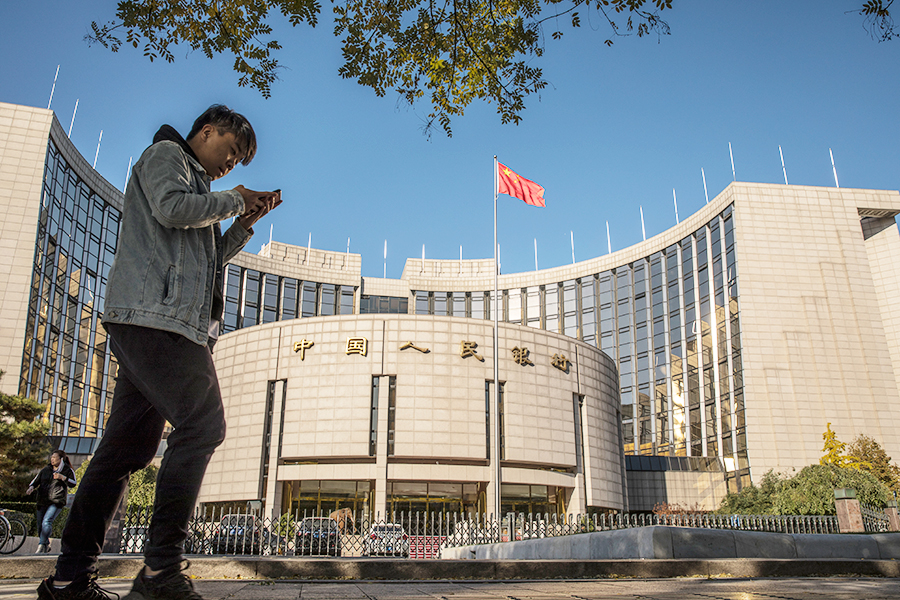PBOC policy seen staying accommodative

A pedestrian walks past the headquarters of the People's Bank of China in Beijing. [Photo/China Daily]
Experts: Central bank's goal is boost to consumer spending as inflation mild
China's monetary policy is expected to stay accommodative to boost consumer spending as inflationary pressures remain muted, experts said on Monday.
They underlined the need for the People's Bank of China, the country's central bank, to ensure ample market liquidity and reduce the financial burdens facing homebuyers to boost their spending power.
The comments came as the market is closely watching the medium-term lending facility operation of the PBOC, scheduled to be delivered on Wednesday.
The MLF is an instrument where the central bank provides loans to financial institutions to adjust market liquidity and determine the policy interest rate benchmark. On Wednesday, MLF loans worth 300 billion yuan ($43.9 billion) in all are expected to mature.
Lou Feipeng, a researcher at Postal Savings Bank of China, said it is reasonable for the MLF operation to inject additional liquidity on top of rolling over the maturing amount to meet market demand for liquidity and back the country's economic recovery.
"Mild inflation has provided bigger space for monetary policy to maneuver," Lou said.
The growth in China's consumer price index, a key indicator of inflation, remained mild at 2.1 percent year-on-year in January, albeit up from 1.8 percent in December, according to the National Bureau of Statistics.
Targeted monetary support should also be amplified to boost consumer spending, Lou said. "Measures to reduce the interest burden brought by outstanding mortgages can help ease households' financial pressure and boost consumer spending."
Data from the PBOC showed that household credit demand has remained sluggish despite a fast aggregate credit expansion.
The PBOC said on Friday that new yuan-denominated loans increased by 922.7 billion yuan year-on-year to 4.9 trillion yuan last month, which experts said marked the highest level on record and reflected the effect of policy efforts to spur infrastructure investment.
New yuan loans to households, however, dropped from 843 billion yuan a year ago to 257.2 billion yuan in January. Experts attributed the drop to consumer confidence that is yet to fully recover and lingering weakness in property sales.
"A key focus of monetary policy should be further promoting a steady development of the property market, which has a direct bearing on people's lives," said Su Jian, a professor at Peking University's School of Economics.
Some homebuyers have reportedly sought to repay their mortgage principal earlier than scheduled as they deemed the interest burden of their mortgages relatively high.
Su said tamping down interest rates of outstanding mortgages should be conducive to boosting consumer spending, adding that it is still reasonable to cut the interest rate of MLFs to ease the financial cost of households and businesses.
Zhou Maohua, a macroeconomic analyst at China Everbright Bank, however, said he expects the MLF interest rate to stay unchanged on Wednesday as the PBOC may need to further gauge the strength in credit demand after January's strong recovery.
China last cut the MLF interest rate in August by 10 basis points to 2.75 percent.
Given that consumers' credit demand remains lukewarm, multipronged financial policies are expected to promote consumer spending, including reducing the cost of borrowing consumer loans and stabilizing the property market, Zhou said.
A recent executive meeting of the State Council, China's Cabinet, decided that consumer loans will be increased as appropriate, while a city-specific approach should be taken to meet people's basic housing needs and the need for improved housing conditions.
Photos
Related Stories
- China's monetary policy to boost domestic demand, supply-side structural reform: central bank
- China's central bank pledges precise, solid implementation of prudent monetary policy
- China's central bank conducts reverse repos to boost liquidity
- China conducts central bank bills swap
- China's central bank conducts reverse repos to boost liquidity
- More policy support set for real economy
- China's central bank conducts reverse repos to boost liquidity
- China central bank continues to inject liquidity via reverse repos
- PBOC to deepen reform on foreign exchange market
- China conducts central bank bills swap
Copyright © 2023 People's Daily Online. All Rights Reserved.









